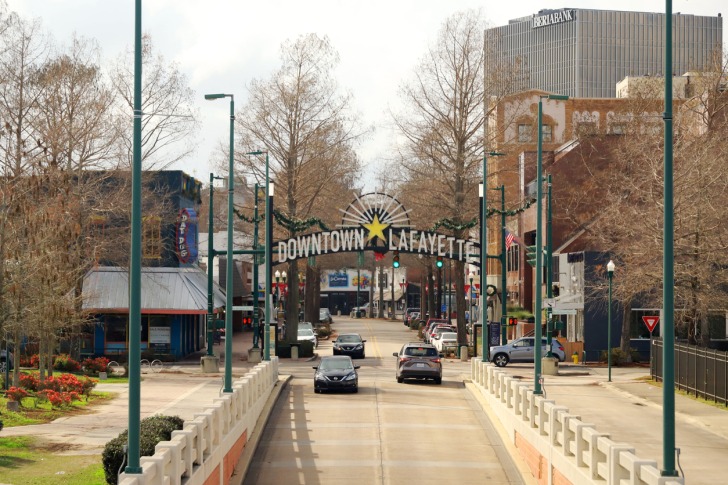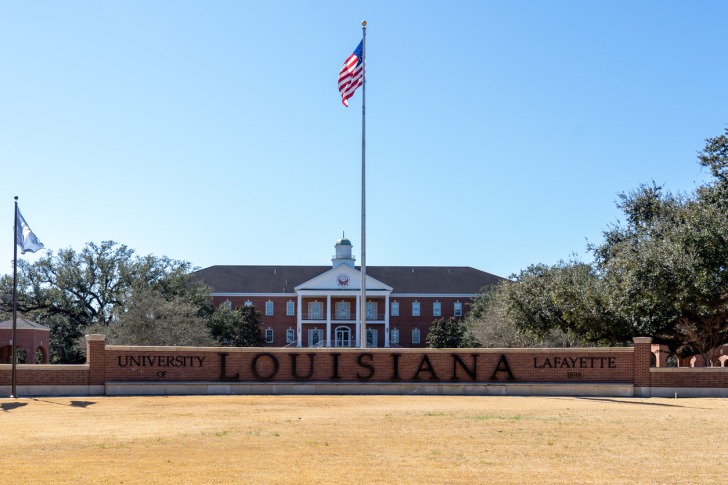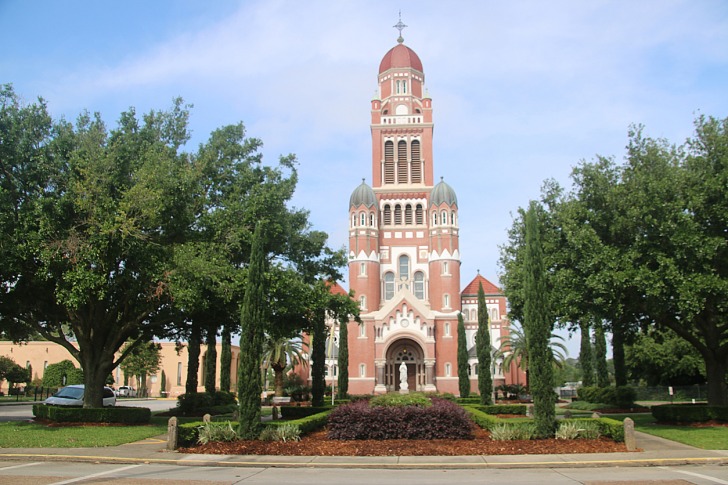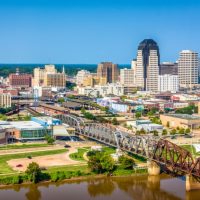Lafayette, Louisiana, known as the hub city, is a regional home to universities, a thriving art scene, energy research and development, and a growing medical center.
The Bayou State’s second-largest city, of roughly 125,000, has a storied and decidedly French history.
The first European settlers were French Arcadians. Co-existing and trading with the first inhabitants of Southern Louisiana, the Attakapa Natives, they established a trading post along the Vermillion River.
It was named — Petit Manchac – “the little back door” for its river access to the area.
It marked the crossroads of the Old Spanish Trail and the waterway.
In 1821, a Roman Catholic Church was christened in Vermillion Parish, and Vermillionville was born.
Three years later, the city changed its name to honor the French Aristocrat and American Revolutionary War hero, the Marquis de Lafayette.
Nestled between Baton Rouge, 59 miles to its west, and New Orleans, 135 miles to the southeast, this storied city is a cultural mix with a few pirate stories through in for spice.
A foodie’s paradise, Lafayette was born of water and continues to be a bayou-based community.
It is home to the University of Louisiana Ragin’ Cajuns and over eight science, cultural, and fine museums.
And no less than eight downtown buildings are on the National Register of Historic Places listing.

Contents
Pros of Living in Lafayette
1. Diversity
Lafayette’s cultural diversity can be seen in every aspect of the community.
It is home to numerous religions, voices, and languages.
It was originally settled some 10,000 years ago by the semi-nomadic tribe Saclans.
Early in the 18th century, Arcadias from Nova Scotia, French, and Spanish.
A number of languages are spoken throughout southern Louisiana, including French, American English, and the localized Cajun dialect.
2. Mid-Size City
Lafayette is a quintessential Gulf Coast city, surrounded by rivers and estuaries.
A clean and welcoming city of 125,000, it was once named the “happiest city in America.”
3. Strong Cultural History
The hub city is known for its vibrant and unique Cajun and Creole cultures – offering a rich tapestry of music, cuisine, languages, and traditions.
This 55-square-mile community is often called the “Cajun and Zydeco Capital of the World.”
4. Low Cost of Living
The cost of living in Lafayette is relatively lower than most of the Bayou State – 7% less.
And it remains 2% lower than the national average.
The vast majority of living costs are housing expenses, utilities, and food costs.
Cars or other personal transportation is necessary, as only downtown has an integrated public transportation system.
5. Artistic Haven
Lafayette has roughly twelve public and private museums, including the Hilliard University Art Museum, the Lafayette Museum of Art, and the Lafayette Museum Alexandre Mouton House.
Downtown continues to develop as a mini arts district with the Acadiana Center for the Arts (ACA), dozens of private art galleries, and Boudin House-home to the Lafayette Ballet company.
One of the most popular museums is the Vermillion Living History Museum and Folklife Park.
6. Festivals and Music
Lafayette hosts a variety of festivals throughout the year.
From gumbo to zydeco, festivals unite this community.
One of the most well-known music gatherings is the 300,000-strong Festival International de Louisiane.
The Blackpot Festival and Cook-off and the Boudin Cook-off and Bacon Festival highlight the tastes of the regions.
Being on the Gulf of Mexico, crawfish festivals are plentiful.
And the Mardi Gras celebration is a family-friendly affair.
7. Outdoor Activities
Nature thrives in this Gulf Coast city.
Lafayette has 15 hiking and biking trails, six miles of which are within the Acadinia Park Nature Trail.
The Nature Station Museum is worth a few minutes of browsing time, and nearby, the Atachafalya swamplands are a tourist treasure.
Lafayette is also home to 36 parks and three golf courses.
The Gulf of Mexico is less than 50 miles away, with the lure of fishing, camping, and boating.
8. Food Lover’s Paradise
The city is a food lover’s paradise, with numerous restaurants serving delicious Cajun and Creole dishes like gumbo, jambalaya, and crawfish.
Lafayette is celebrated for its Boudin – a balled, fried mixture of rice, sausage or meat, flour, and spices.
9. Advanced Education
Lafayette is celebrated for its post-secondary education with eight public and private colleges and universities.
There are also three community and vocational colleges offering two-year degrees and specialized education.
10. Employment Options
Hub City is a long-standing center for energy research and production.
But there is also a growing medical and healthcare industry.
Some of Lafayette’s largest employers are Halliburton, Delta Electronics, Amazon, the University of Louisiana, and the medical center of Our Lady of Lourdes.
Lafayette is a tight-knit, mid-sized community epitomizing the style and grace of old Louisiana and focusing on the pleasures of small-town life.
But, the city has some drawbacks.
If changeable weather, spicy food, fewer shopping options, or minimal public services are not to your liking, it may be best to research other options.
Cons of Living in Lafayette
1. Small Town
Roughly 125,000 make Lafayette home.
And that number grows by roughly 2% each year.
This zydeco-infused city is now rated 51st in the nation for “best places to retire” and the second-best place in the country for young professionals.
A city’s growth rate can be both good and bad. It adds to the economy, but if unplanned, the city may struggle.
2. Notable Crime
Some areas in Lafayette experience higher crime rates, so researching a potential area is vital to safety and peace of mind.
Violent crime rates in the city varied.
Overall, there is a 1 in 166 chance of encountering a violent crime.
Slightly higher, the property crime rate was roughly twice the state average – a 1 in 24 chance of property damage.
However, in context and when compared to nearby cities, Lafayette remained safer than most of Louisiana’s major metropolitan areas.
3. Economic Diversity
The local economy is closely tied to the oil and gas industry, which can lead to financial volatility during industry downturns.
This limits the available job opportunities.
Without proper training, the job market may not be as diverse as in larger cities.
4. Weather
Lafayette sits 50 miles from the Gulf Coast and is highly vulnerable to hurricanes.
This requires residents to be diligent -preparing for the damage and dangers of hurricane season.
Southern Louisiana, like most of the Gulf Coast, is known for oppressively humid and hot weather.
Summers can be overwhelming if air conditioning or water sports are not involved.
Lafayette is also prone to flooding.
Whether from a storm in the Gulf of Mexico or as a result of the intense thunder and rainstorms, the elements are ever present.
On a positive note, there are few earthquakes felt in the region, and it rarely snows.
5. Higher Taxes
Property and city sales taxes vary throughout Lafayette and Lafayette Parish.
The city has a sales tax rate of 10.45%, and property and other tax rates hover around 2%.
The state of Louisiana also has a 6% individual income tax.
6. Limited Healthcare Specialization
Although the healthcare profession is growing in Lafayette, there are only two major medical centers.
This often requires travel for specialized care.
7. Limited Public Services
Public transportation is not as extensive as in larger cities.
Bus routes are plentiful downtown, but riders find reaching suburban areas difficult and time-consuming.
There are no light rail or downtown trolley systems.
This makes owning a car in Lafayette necessary.
Public services, public libraries, and recreational facilities exist but are limited compared to larger cities.
8. Traffic Congestion
Lafayette is known for highly congested traffic, especially near the east-west corridor of Interstate 10.
Some neighborhoods may have subpar road conditions, and aggressive driving can be an issue.
Flooding is always an issue and can add to hazardous driving conditions.
Traffic during peak hours in the morning and early evening leads to longer commutes.
9. Education Funding
Louisiana has faced challenges in public education funding, potentially affecting the quality of schools.
Primary and secondary education in Lafayette is ranked #1643 nationally.
Alternately, Lafayette High School is ranked in the top 25 secondary schools in the state.
School ranking usually compares scores on annual national and state testing.
10. Slower Pace
Living in Lafayette takes on a slower pace than metropolitan hubs such as Houston or New York.
This is true for most small to mid-sized communities.
For some people, this is a blessing.
For others who search for activity 24 hours a day, this may prove an unpleasant environment.
There are very few perfect places. Choosing a place to attend school, live, and work is most often about priorities.
But with a bit of research about the pros and cons of living in Lafayette, Louisiana, you should be able to find the perfect fit.

Pros and Cons of Living in Lafayette, LA – Summary Table
| Pros of Living in Lafayette | Cons of Living in Lafayette |
|---|---|
| 1. Diversity | 1. Small Town |
| 2. Mid-Size City | 2. Notable Crime |
| 3. Strong Cultural History | 3. Economic Diversity |
| 4. Low Cost of Living | 4. Weather |
| 5. Artistic Haven | 5. Higher Taxes |
| 6. Festivals and Music | 6. Limited Healthcare Specialization |
| 7. Outdoor Activities | 7. Limited Public Services |
| 8. Food Lover's Paradise | 8. Traffic Congestion |
| 9. Advanced Education | 9. Education Funding |
| 10. Employment Options | 10. Slower Pace |
Lafayette Safety Overview
READ THE FULL REPORT: Lafayette Safety Review
Safety Index:
- OVERALL RISK: LOW
- TRANSPORT & TAXIS RISK: LOW
- PICKPOCKETS RISK: LOW
- NATURAL DISASTERS RISK: HIGH
- MUGGING RISK: LOW
- TERRORISM RISK: LOW
- SCAMS RISK: LOW
- WOMEN TRAVELERS RISK: LOW
Frequently Asked Questions
What is the median age in Lafayette, LA?
Lafayette is a young and active city.
The average age of residents is 37 years old.
What is the average salary in Lafayette, LA?
The opportunities in Lafayette for work are growing.
Energy production and research are some of the leading employers.
The average salary in Lafayette is roughly $51,500—employment options throughout the city range from $25,000 to over $110,000.
Does Lafayette, LA, have a Children's Museum?
The southern Louisiana city is famous for the Children’s Museum of Acadiana, featuring play-centric exhibits that enhance a child’s knowledge and imagination.
Does Lafayette, LA, have a baseball team?
Lafayette currently does not have major or minor-league baseball teams.
However, there are numerous collegiate teams to satisfy fan’s need for the diamond-based sport.
What University is near Lafayette, LA?
The University of Louisiana Lafayette takes pride in its place in the city.
This prestigious research university was founded in 1898.
Its undergraduate program has a strong focus on liberal arts, science, and technology.
It has been recognized by the Carnegie Foundation as a high research institution.












Lafayette is a vibrant, mid-sized city with rich cultural history and diversity, affordable living costs, thriving arts scene and delicious food options; however the high crime rates in some areas, limited job opportunities outside of oil industry and lackluster public services can be off-putting.